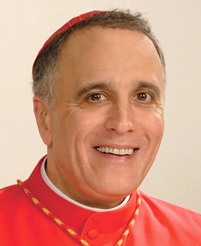The president of the U.S. Conference of Catholic Bishops today appeared cautiously encouraged by President Donald Trump's executive order on religious freedom, issuing a statement saying the order "begins the process of alleviating the serious burden of the HHS mandate."
 Cardinal Daniel DiNardo of Galveston-Houston said he and his brother bishops across the country "will engage with the Administration" to work to find relief for religiously-affiliated organizations that have been fighting the mandate handed down by the federal Department of Health and Human Services (HHS) in 2012 requiring all employers to offer insurance coverage of contraceptives, sterilizations, and abortion-inducing drugs.
Cardinal Daniel DiNardo of Galveston-Houston said he and his brother bishops across the country "will engage with the Administration" to work to find relief for religiously-affiliated organizations that have been fighting the mandate handed down by the federal Department of Health and Human Services (HHS) in 2012 requiring all employers to offer insurance coverage of contraceptives, sterilizations, and abortion-inducing drugs.
"We welcome a decision to provide a broad religious exemption to the HHS mandate, but will have to review the details of any regulatory proposals," DiNardo wrote in a statement.
The Little Sisters of the Poor and several other religiously-affiliated organizations sued the federal government over the mandate, contending it made them complicit in providing the morally-objectionable products and was a violation of the federal Religious Freedom Restoration Act. The U.S. Supreme Court heard the case, and in May 2016 unanimously sent the dispute back to the federal appeals court, telling the nuns and the government to work out a compromise.
Today's executive order is the most recent action on the HHS mandate since Trump was sworn in as president on Jan. 20. The section of the order dealing with the mandate states that, "The Secretary of the Treasury, the Secretary of Labor, and the Secretary of Health and Human Services shall consider issuing amended regulations, consistent with applicable law, to address conscience-based objections to the preventive-care mandate promulgated under section 300gg-13(a)(4) of title 42, United States Code."
Several members of the Little Sisters of the Poor attended the signing ceremony at the White House rose garden. Trump invited them to stand with him at the podium, telling them, “I want you to know that your long ordeal will soon be over."
The order also appears to lift the restrictions placed on churches by the 1954 Johnson Amendment, which calls for churches and other nonprofit organizations that are exempt from taxation to be "absolutely prohibited from directly or indirectly participating in, or intervening in, any political campaign on behalf of (or in opposition to) any candidate for elective public office," according to the website of the Internal Revenue Service.
DiNardo in his statement, however, focused on the importance of freedom to live and practice one's religion.
"Religious freedom is a fundamental right that should be upheld by all branches of government and not subject to political whims," he wrote.

